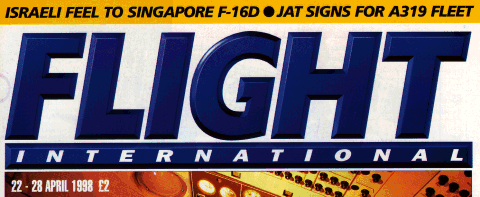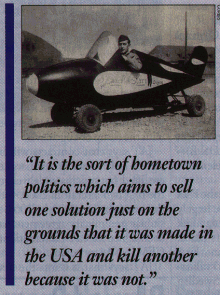
The following article has been converted to HTML format.

COMMENT
DRAWING A LINE
IN THE next few days, a US Federal Aviation Administration (FAA) delegation will walk into an ICAO conference chamber and prepare to put their arguments over a key element of the Future Air Navigation System (FANS). The case that they plan to make may look like genuine concern with smooth technical advancement. Its real aims are nothing of the sort, being more concerned with offering protection to the US industry regardless of the cost to the global aviation community.

If this were an isolated piece of manoeuvring on an obscure issue, then compromise might be the order of the day. Unfortunately, that is not the case. Not only is the particular point too important in itself to ignore, but it threatens to cripple one of the most promising contenders in the race between competing technologies to underpin FANS.
What the USA hopes to do is to divert or delay the vital ICAO "validation" process of a largely Swedish-developed self-organising, time-division, multiple-access (STDMA) VHF datalink technology. Inevitably, the US intent is masked by rather more soothing language, but happily it has been rumbled and now faces a storm of protest from European interests that have invested hefty amounts of time and money in highly browsing experiments with the system.
All this matters, because optimum datalinking is at the very heart of the type of "free flight" operations on which the airspace of the future seems certain to be based.
The problem for the USA is that European researchers are rapidly pulling ahead in developing solutions to the fundamental challenge of improving airspace capacity. Not only have they seen the potential of the STDMA technology but, in a model example of government/industry co-operation, they have implemented with some flair a real-world, international demonstration programme. US industry and operational FAA officials are frankly envious - and privately say as much.
Whatever the technical disagreements, there is certainly no question that STDMA works - a series of trials have already been carried out across Europe with dramatic success. The FAA argues that the Mode-S datalink, already used for Traffic Alert and Collision Avoidance Systems (TCAS), is a more suitable solution. Given that both systems have strong links to their respective aerospace industries - STDMA has been pushed evangelically by the Swedes and Mode-S is essentially a US system -it would seem to make sense to look to potential users for an unbiased opinion. What one then finds is a band of technically sophisticated airlines, notably Lufthansa and SAS, that have opted to pursue STDMA, not to prove a political point but because it holds out a solution to a pressing commercial problem. If FANS planners had so far paid more attention to the interests of system users and less to those of vendors and service providers, then the whole FANS concept might be substantially further along.
In this instance the logic is overwhelming. The reason that the airlines take the view that they do is that they fear the coming of disastrous airspace congestion, particularly in Europe, and want a robust solution.
They are right to worry. There is something of a mindset in commercial aviation that, given the astonishing success of the industry in its first 80-odd years of existence, everything will come right in the end. That is not necessarily so. There is unquestionably some finite limit to the amount of air traffic that can be accommodated in the world's skies, and the signs are that even that will not fully satisfy passenger and freight demand. We do not know how close to that limit we already are, but compromised technical solutions can only bring the dark day forward.
When the FAA officials turn up for the ICAO meeting they will find arrayed against them just about every expert in Europe - and one or two in the USA. If they look over their shoulders they will be greeted by the sight of a host of similarly knowledgeable US figures keeping a safe distance.
As they know only too well, the progress of FANS is already agonisingly slow, and it can ill-afford to be further hampered by the sort of hometown politics which aims to sell one solution just on the grounds that it was made in the USA and kill another because it was not.
C 1998 Reed Business Information Ltd.
FLIGHT INTERNATIONAL 22 - 28 April 1998
Press clip as MS WORD dokument